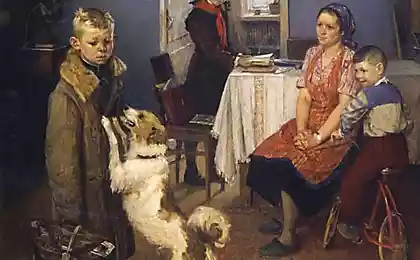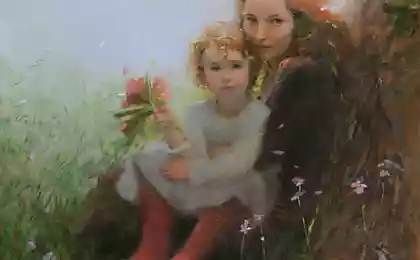513
Find out what feelings the parents pretend to love
Forty three million two hundred forty one thousand ninety two
© Christopher Gilbert
Parental love is ambiguous. Often moms and dads a substitute for the notion similar manifestations of feelings: jealousy, Hyper, possessiveness, anxiety, and addiction. How to detect the substitution effect and the more dangerous it is for your child?
Hyper the Desire to constantly monitor their child's excessively doting mother (and they often connect compassionate grandmother) explain that love. Mother-hen do not let the child out of sight. The manifestation of autonomy of offspring tend to hyperopic mother regarded as a direct threat to family harmony.
Hyper is practically not satisfactory when a small child. Toddler really requires attention and care. However, some parents ' desire for guardianship with the passage of time continues unabated. There are cases when children grow up, and moms continue to see them as helpless kids, every step of which requires control.
"Don't you go play in the yard next door. Do not be friends with this boy. Do not turn off the phone so I could get a hold of you. Let me know when you get home", phrases that indicate increasing anxiety. Danger: children who are victim of hyperopic, not able to take the initiative to depend on the opinion of others rely on third-party assistance.
Jealousy is Jealous – means likes. Remember this common and quite controversial saying? Between the concepts of "jealousy" and "love" to put an equal sign is not always advisable. In some cases, jealousy displaces other more positive feelings: concern, affection, tenderness.
How and to whom can you be jealous of your child? Some are jealous of their marital partner (e.g. the mother feels discomfort when the child spends more time with his father), other relatives (grandparents) to the classroom teachers or close friends of the offspring.
As a rule, jealous parents don't like the fact that the child needs the care of a third party, albeit close to him, listens to him, follows his advice. "If he prefers me as a different person, so I'm doing something wrong. I must be a bad parent," for such thoughts lurking fear of being rejected, unloved, forgotten. Danger: the child is afraid to experience and Express the feeling of affection towards someone else, other than parents; there is growing confidence that true love deserves only the mother (or father).
Possessiveness
Parents-selfish trying by all means to "bind" to a child. Possessiveness is typical for mothers whose pregnancy proceeded with complications. The woman who for nine months was afraid to lose a child, razrushivshij from the burden, strives to maintain contact with the baby.
"He's my flesh and blood. I spent so much effort coming up with it, so now I want to, he was always close," the justified mother, not step itself, issuing from the baby.
Dads often display a sense of ownership in relation to daughters than to sons. Fathers, limiting the freedom of teenage daughters, it seems, that thereby they could protect them from social dangers. In fact, dads-owners unbearable to realize that their babies are growing up, moving away and preparing to leave the parental nest. Danger: children "" parents, inert, uncomplaining, experience a sense of guilt when not able to exercise due to mother or father.
Anxiety
A concern for the present and future of the child in every parent. Another thing, when increased anxiety inhibits other positive feelings. So, anxious mother will not be happy for the son who goes on a hike with the class and disturbing the Pope banned teenage daughter Dating.
If you ask these parents why they tend to paint with black color, they are puzzled shrug, they say, they have never had anything to infringe on the child, they just worry that with him something happened. Danger: increased anxiety is transmitted from parents to children; they become restless, nervous, afraid to make important decisions and get out of the comfort zone.
Dependence
Some parents experience a real dependence on their children. Moms and dads try to be with the children the maximum amount of time: take them with you to work or to meet with friends. Dependent parents deprive a child of the right to personal time and space.
In the end, both children and their parents feel empty and alone, when circumstances force them to move away from each other. Over time, the thread linking the parent and child, turns into a durable rope. Break it difficult. As a rule, attempts of separation take maturing children who want to feel independent. The parents are against, offended, blackmailed and manipulated, trying to revive the old close relationship.
Danger:
children grow up with the confidence that you do not have the right to privacy, they don't make decisions without asking the advice, I'm afraid to operate outside the bounds of what is permitted by parents adjust their lives to the needs and needs of loved ones. published
P. S. And remember, only by changing their consumption — together we change the world! ©
Source: letidor.ru/article/psikhologicheskiy-obman_-5-chu_158822/
© Christopher Gilbert
Parental love is ambiguous. Often moms and dads a substitute for the notion similar manifestations of feelings: jealousy, Hyper, possessiveness, anxiety, and addiction. How to detect the substitution effect and the more dangerous it is for your child?
Hyper the Desire to constantly monitor their child's excessively doting mother (and they often connect compassionate grandmother) explain that love. Mother-hen do not let the child out of sight. The manifestation of autonomy of offspring tend to hyperopic mother regarded as a direct threat to family harmony.
Hyper is practically not satisfactory when a small child. Toddler really requires attention and care. However, some parents ' desire for guardianship with the passage of time continues unabated. There are cases when children grow up, and moms continue to see them as helpless kids, every step of which requires control.
"Don't you go play in the yard next door. Do not be friends with this boy. Do not turn off the phone so I could get a hold of you. Let me know when you get home", phrases that indicate increasing anxiety. Danger: children who are victim of hyperopic, not able to take the initiative to depend on the opinion of others rely on third-party assistance.
Jealousy is Jealous – means likes. Remember this common and quite controversial saying? Between the concepts of "jealousy" and "love" to put an equal sign is not always advisable. In some cases, jealousy displaces other more positive feelings: concern, affection, tenderness.
How and to whom can you be jealous of your child? Some are jealous of their marital partner (e.g. the mother feels discomfort when the child spends more time with his father), other relatives (grandparents) to the classroom teachers or close friends of the offspring.
As a rule, jealous parents don't like the fact that the child needs the care of a third party, albeit close to him, listens to him, follows his advice. "If he prefers me as a different person, so I'm doing something wrong. I must be a bad parent," for such thoughts lurking fear of being rejected, unloved, forgotten. Danger: the child is afraid to experience and Express the feeling of affection towards someone else, other than parents; there is growing confidence that true love deserves only the mother (or father).
Possessiveness
Parents-selfish trying by all means to "bind" to a child. Possessiveness is typical for mothers whose pregnancy proceeded with complications. The woman who for nine months was afraid to lose a child, razrushivshij from the burden, strives to maintain contact with the baby.
"He's my flesh and blood. I spent so much effort coming up with it, so now I want to, he was always close," the justified mother, not step itself, issuing from the baby.
Dads often display a sense of ownership in relation to daughters than to sons. Fathers, limiting the freedom of teenage daughters, it seems, that thereby they could protect them from social dangers. In fact, dads-owners unbearable to realize that their babies are growing up, moving away and preparing to leave the parental nest. Danger: children "" parents, inert, uncomplaining, experience a sense of guilt when not able to exercise due to mother or father.
Anxiety
A concern for the present and future of the child in every parent. Another thing, when increased anxiety inhibits other positive feelings. So, anxious mother will not be happy for the son who goes on a hike with the class and disturbing the Pope banned teenage daughter Dating.
If you ask these parents why they tend to paint with black color, they are puzzled shrug, they say, they have never had anything to infringe on the child, they just worry that with him something happened. Danger: increased anxiety is transmitted from parents to children; they become restless, nervous, afraid to make important decisions and get out of the comfort zone.
Dependence
Some parents experience a real dependence on their children. Moms and dads try to be with the children the maximum amount of time: take them with you to work or to meet with friends. Dependent parents deprive a child of the right to personal time and space.
In the end, both children and their parents feel empty and alone, when circumstances force them to move away from each other. Over time, the thread linking the parent and child, turns into a durable rope. Break it difficult. As a rule, attempts of separation take maturing children who want to feel independent. The parents are against, offended, blackmailed and manipulated, trying to revive the old close relationship.
Danger:
children grow up with the confidence that you do not have the right to privacy, they don't make decisions without asking the advice, I'm afraid to operate outside the bounds of what is permitted by parents adjust their lives to the needs and needs of loved ones. published
P. S. And remember, only by changing their consumption — together we change the world! ©
Source: letidor.ru/article/psikhologicheskiy-obman_-5-chu_158822/
























